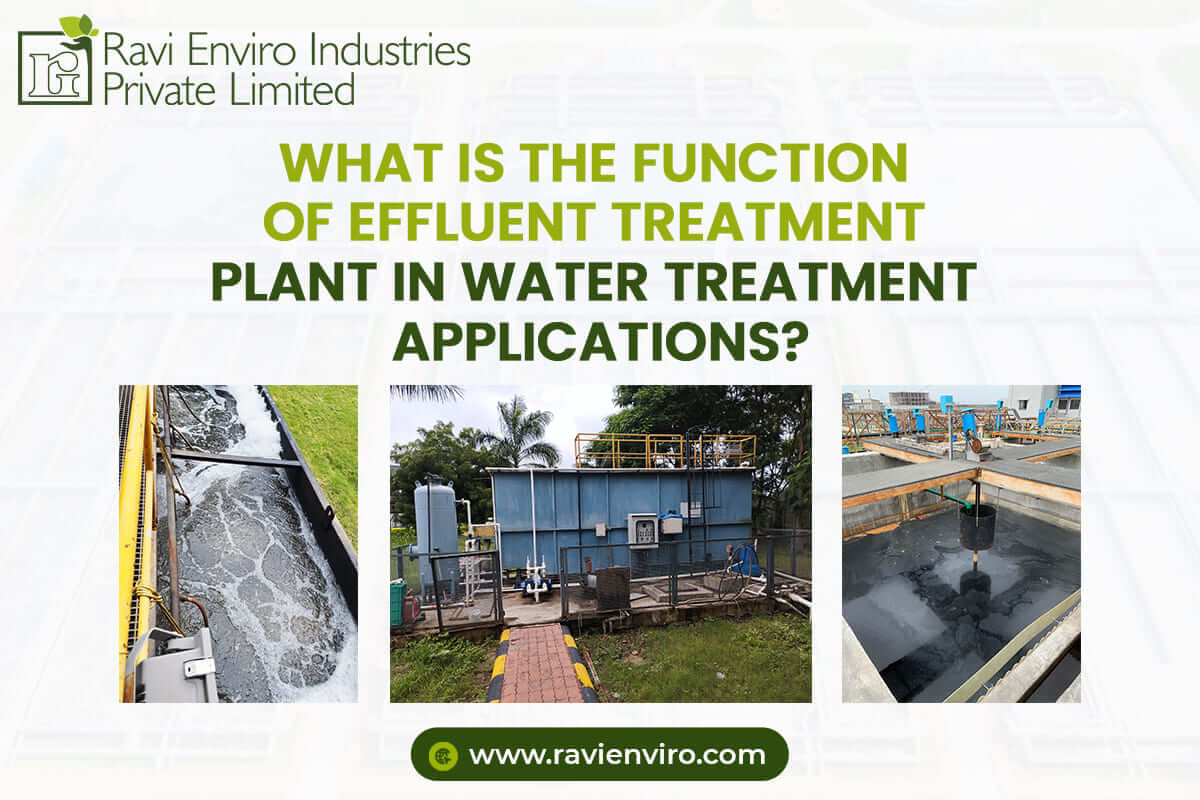
- Sep 18, 2024
- Ravi Enviro
- ETP Plant, Effluent Treatment
- 0 Comments
An ETP plant (effluent treatment plan) plays a pivotal role in water treatment applications. It is designed to treat industrial wastewater for safe reuse or disposal. It is extensively used in industries like textiles, chemicals, petrochemicals, pharmaceuticals, food and beverages, dairy, sugar mills, and others. Contaminants like heavy metal, suspended particles, oil & grease, and inorganic matter are treated in wastewater through a combination of chemical & biological treatment processes in the ETP plants. In this blog, we discuss the function of the effluent treatment plant in water treatment, highlighting its role in the safe disposal of wastewater and environmental protection.
What is an ETP Plant?
An ETP plant is a wastewater treatment facility that is designed to treat wastewater or effluents coming from different industrial processes or commercial processes. The main function of an ETP plant is to eliminate pollutants, contaminants, or organic matter from wastewater before releasing it back into the environment. Ravi Enviro Industries Private Limited is one of the top effluent treatment plant suppliers in India. We manufacture and supply ETP plants and its equipment for innovative wastewater treatment solutions. So, if you are looking for an economical, sustainable, and efficient solution, get in touch with us.
ETP Plant Working Process:
Flow Point: This is where the wastewater enters the ETP plant from different sources. The flow point is connected to industrial pipelines, sewage systems, and other types of wastewater systems.
Primary Treatment: The primary treatment stage of an ETP involves physical and chemical processes like screening, settling, filtration and pH correction, coagulation and flocculation. In screening, a large amount of organic matter and debris are removed; in settling, heavy solid particles are settled at the bottom of the tank, and filtration removes any suspended particles.
Secondary Treatment: The secondary treatment stage involves the biological treatment process. Biological processes include using microbes to break down organic matter while reducing the chemical oxygen demand (COD) and biochemical oxygen demand (BOD).
Tertiary Treatment: The function of ETP plant is incomplete without the tertiary stage. It involves using advanced techniques like filtration, membrane processes, disinfection techniques like UV radiation, ozonation, chlorination, and other methods to ensure the treated water meets the industry standards.
Sludge Management: Sludge is the byproduct of the effluent treatment plant, which consists of biomass and solid residues. The sludge treatment plants dewater and dries and treat sludge for safe disposal.
Different Types of Effluent Treatment Plant
The Following Are Different Types of ETP Plant:
Industrial Effluent Treatment Plant: The industrial water treatment plant manufacturers in India design these types of ETP plants to treat different industrial processes like manufacturing, textile processing, food & beverages production, etc. At REIPL, we tailor the ETP plants to treat contaminants and effluents specific to your industrial process.
Common Effluent Treatment Plant: This is a common facility for multiple industrial units in an industrial estate. It allows smaller industries to treat wastewater at an economical cost and adhere to environmental guidelines.
The Function of ETP Plant
Environmental Protection: The primary function of an ETP plant is environmental protection and human health. Industrial processes produce wastewater that consists of chemicals, organic matter, suspended particles, and other substances that can have a negative impact on the environment and human health. ETP plants remove contaminants and pollutants from wastewater to ensure treated water is disposed of back into nature.
Meeting Standard Set By Govt Boards: It is mandatory for industries to treat their wastewater and comply with the parameters set by the concerned authorities like the Central Pollution Control Board and State Pollution Control Boards. ETPs help to adhere to guidelines, protect the environment, and avoid heavy penalties.
Health & Safety: Water is a precious resource that is the lifeline of the environment and health. Contaminated water can pose serious health risks like waterborne diseases. ETP plants contribute to health and safety by removing harmful contaminants before the wastewater is released back into the water bodies and environment.
Water Conservation: Apart from treating wastewater, ETP plants also promote water conservation. The treated water can be used for irrigation systems, cooling, and other applications, reducing the use of freshwater and gaining water credits.
With the advancement of technology and innovation, ETP plants are constantly evolving to become more efficient, eco-friendly, and economical. ETP plants continue to play a big role in protecting the environment, complying with guidelines, removing contaminants, and safe disposal of treated water. Ravi Enviro Industries Private Limited is a leading water treatment plant manufacturer in India, specializing in designing and manufacturing sophisticated water treatment solutions. Our team is well-equipped to tailor ETP plants to your specific industrial processes; moreover, we can provide maintenance services for ETP plants. We are the one-stop destination for all your WWTP plant needs. To discuss your WWTP needs, call us today.
Visit Now:- How to Make ETP Plants More Energy Efficient?



